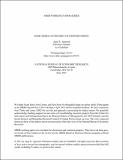Some Simple Economics of Crowdfunding
Author(s)
Goldfarb, Avi; Agrawal, Ajay K; Catalini, Christian
DownloadSome+Simple+Economics+of+Crowdfunding.pdf (2.287Mb)
OPEN_ACCESS_POLICY
Open Access Policy
Creative Commons Attribution-Noncommercial-Share Alike
Terms of use
Metadata
Show full item recordAbstract
It is not surprising that the financing of early-stage creative projects and ventures is typically geographically localized since these types of funding decisions are usually predicated on personal relationships and due diligence requiring face-to-face interactions in response to high levels of risk, uncertainty, and information asymmetry. So, to economists, the recent rise of crowdfunding - raising capital from many people through an online platform - which offers little opportunity for careful due diligence and involves not only friends and family but also many strangers from near and far, is initially startling. On the eve of launching equity-based crowdfunding, a new market for early-stage finance in the U.S., we provide a preliminary exploration of its underlying economics. We highlight the extent to which economic theory, in particular transaction costs, reputation, and market design, can explain the rise of non-equity crowdfunding and offer a framework for speculating on how equity-based crowdfunding may unfold. We conclude by articulating open questions related to how crowdfunding may affect social welfare and the rate and direction of innovation.
Date issued
2014Department
Sloan School of ManagementJournal
Innovation Policy and the Economy 2013
Publisher
University of Chicago Press
Citation
Agrawal, Ajay K., Catalini, Christian, and Goldfarb, Avi. "Some Simple Economics of Crowdfunding." Innovation Policy and the Economy 2013, ed. Josh Lerner and Scott Stern, Univeristy of Chicago Press, 2014, 1-47. © 2014
National Bureau of Economic Research Innovation Policy and the Economy
Version: Author's final manuscript
ISBN
9780226158563